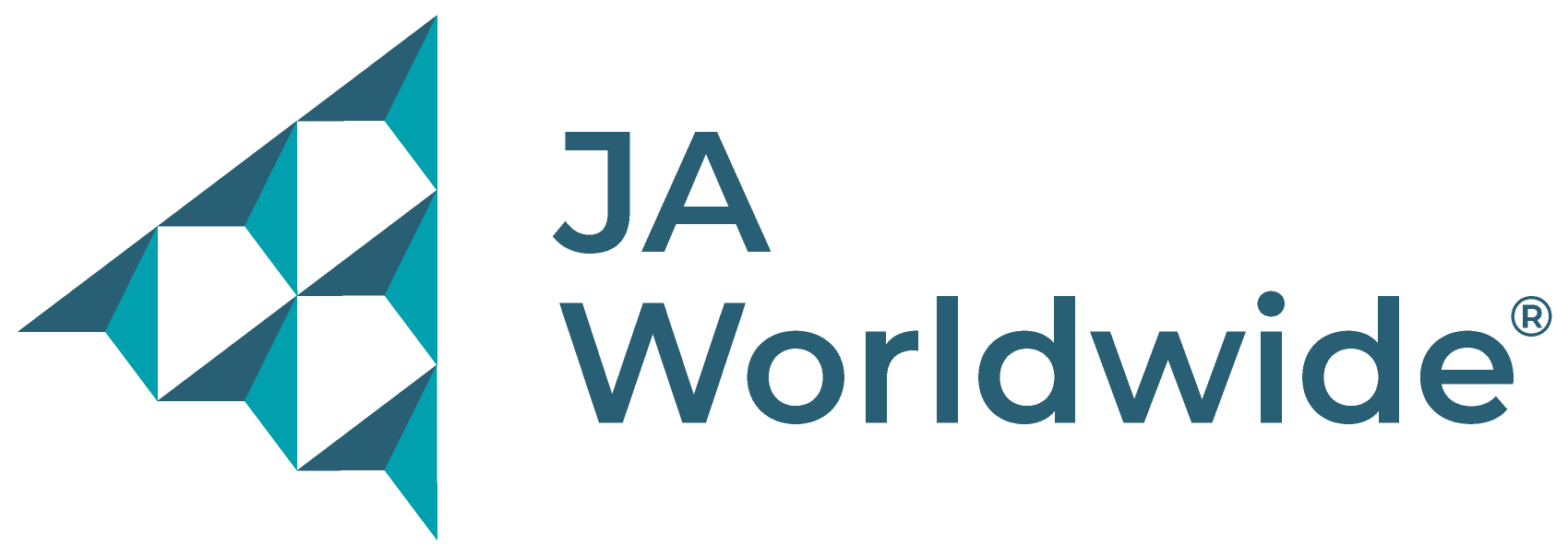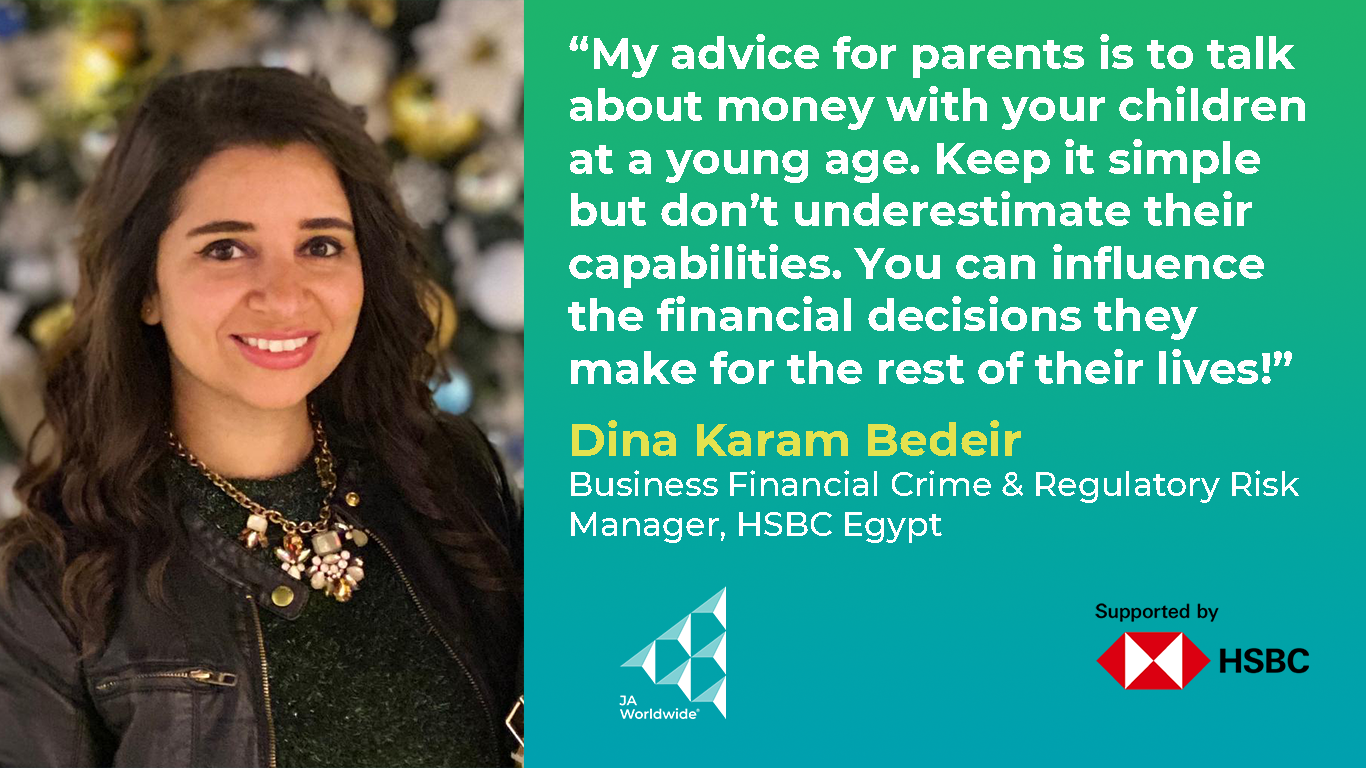Money Talk with Dina at HSBC
Dina Karam embodies HSBC’s commitment to helping the next generation gain the future skills they need to thrive.
As her career has grown, so too has her commitment to giving back to her community. During her day job, she serves as Business Financial Crime & Regulatory Risk Manager at HSBC in Egypt. But that’s just one part of her official title. She is also Sustainability Lead, Future Skills Influencer, Financial Capability Trainer & Mentor, Balance Ambassador, and Global Jam Champion. Since she joined HSBC in 2011, she has volunteered each year in JA programs and impacted the lives of hundreds of young people.
This year, she served as a mentor and Innovation Challenge judge in the JA Building a Financially Capable Generation initiative. Her responsibility: to help young people gain the skillset and mindset they need to own their financial futures.
First, Dina guided a group of students through an introductory workshop that teaches young people the value of proactively managing money and making smart decisions when it comes to saving and spending responsibly. After the workshop, Dina helped groups of students prepare and present ideas for marketing a podcast that provides a safe and supportive space for young people and adults to have frank and honest conversations about money.
We sat down with Dina to talk about her own financial capability journey and to ask her advice for parents and teachers to help young people become empowered, confident, and capable when it comes to managing their money.
Note: Dina’s responses have been gently edited for clarity and length.
What does financial capability look like in your life?
“Financial capability looks different for different people. For me, to be financially capable is to be financially secure and ready for any emergency that might pop up. It means being resilient to withstand life’s financial surprises. It means being responsible with your money so that you can manage your expenses and support your family without incurring insurmountable debts or experiencing great difficulty.”
When it comes to your own childhood experience with money, what is the best piece of advice you got?
“When I was six years old, my mother taught me that money is not always available. We have to work hard to earn it, and it’s important to save it. In fact, I first started saving money when I was in Kindergarten! I had a piggy bank that I saved some of my pocket money from my parents. At the end of the month, they would double whatever I had saved as a way to encourage me to practice saving money regularly. That way, I could buy my favorite toy!
My mother also helped me understand the connection between learning in school and earning later in life. Because of her, I worked on developing my skills to stand out in the crowd when I was interviewing for jobs.
She also introduced me to the financial system as she opened a savings certificate for me and my siblings, and then opened my first bank account when I was a teenager so I could save money. I started to earn income in high school by selling my paintings at my school’s art exhibitions.”
How can families normalize talking about money?
“Talking about money is not an option, it is a necessity. It can be challenging, but parents have to play a role in helping young people become capable and confident to talk about money matters. Part of that means talking about financial planning. Everyone needs to have a financial plan, regardless of their socioeconomic class or education level. Talking with children about their goals and connecting those goals to saving money and making smart choices makes a big difference and opens up a world of opportunities for them in the future. Everyone has the ability to become financially capable, it’s just that many don’t have the opportunity to learn how, and so parents have to be a part of that solution.”
What are you most confident about? Least confident about? Where do you go for advice to make good decisions?
“Even though I work at a bank, I still have my own issues with insecurity when it comes to money matters. I seek advice from family members, trusted friends, and professional experts.”
What advice would you give to parents when it comes to helping youth manage their money?
“My advice for parents is to talk about money with your children at a young age. Keep it simple but don’t underestimate their capabilities. You can influence the financial decisions they make for the rest of their lives!”
What is one experience with money that every kid should have before turning 18 years old?
“Parents should speak with their children about money at an early age and teach them how to save and how to put their skills and talent to work to earn money. Kids should learn about wants and needs - not everything they desire is something they need, and so kids need to learn how to make responsible decisions with their money.”
What is a mistake you made that you are willing to share so that a young person can learn from your experience and not make the same mistake?
“When I was younger, sometimes I would get in a bad mood. When I was in a bad mood, I didn’t do a very good job controlling my buying habits so I bought stuff I didn’t need and rarely used. I worked on myself and my well-being and tried to have better self-control and think before buying. I started to be diligent about keeping track of my income and expenses to make sure I was making good decisions with my money no matter what mood I was in.”
Why are you volunteering in the JA Building a Financially Capable Generation program?
“I have been volunteering through HSBC with INJAZ Egypt, INJAZ UAE, and JA Worldwide for 11 years. From day one, I have seen the contributions and social impact that our partnership has on young people. I see the next generation becoming empowered to manage their own financial well-being and confident to talk about money. I see an impact on young people not just in terms of financial literacy, but their ability to make smart decisions because they are becoming financially capable. I can feel the difference with JA more than any other institution I have volunteered with. And I appreciate the opportunity to collaborate with passionate volunteers who do so much to help prepare young people of all socioeconomic backgrounds to pursue their dreams.”
What impact have you had on the children you volunteer with in JA programs?
“Some of the students I met while volunteering with JA have told me directly that I changed the way they thought about money. They said they became motivated to start using their skills to earn money at an early age. And then there was this one student who I met twice in different volunteer events who told me “I remember you Miss Dina! You really changed my life and influenced me. You made a great impact on how I think about money and now I see things from a different perspective.”
Why does this program matter? What difference does it make?
“Youth at this age don’t study this kind of practical material at school. JA Building a Financially Capable Generation gives them great exposure to professionals who volunteer their time to share their personal experiences with money, broaden students’ horizons, and open up a world of opportunities.”

